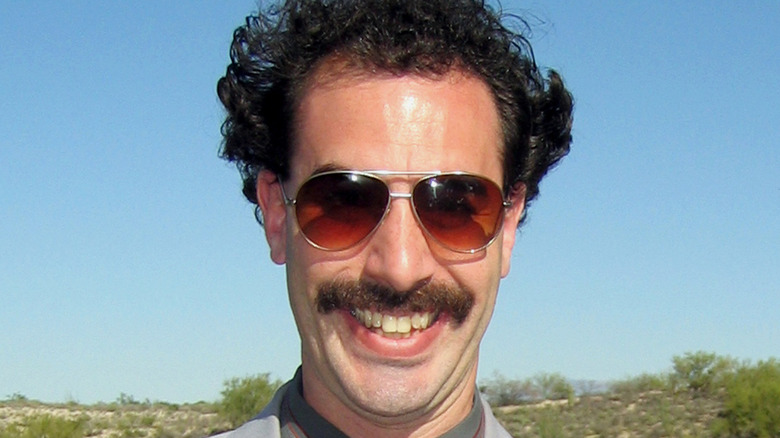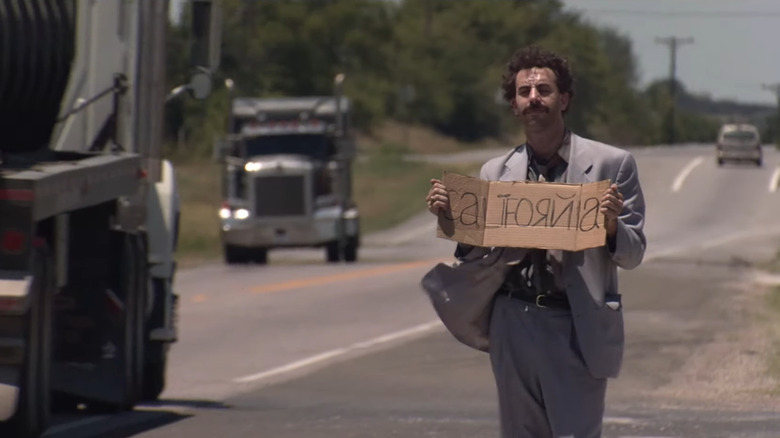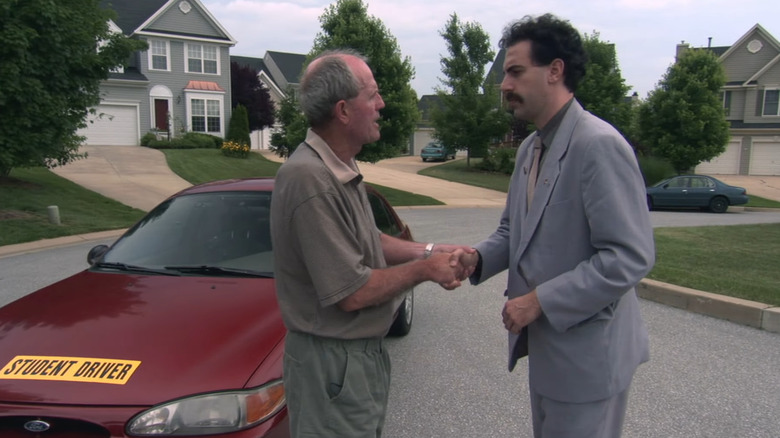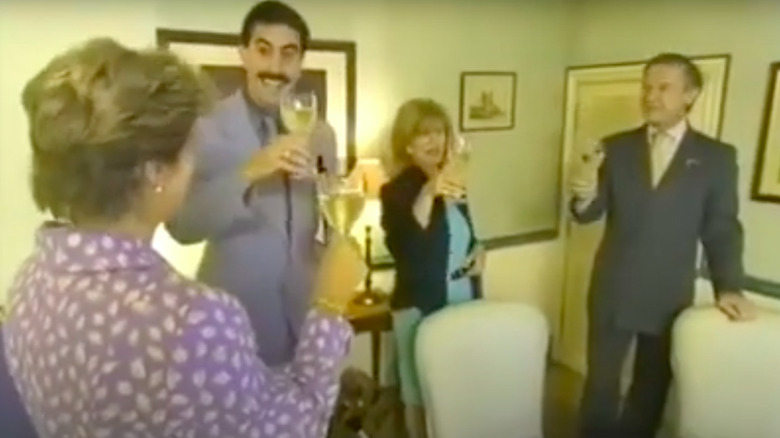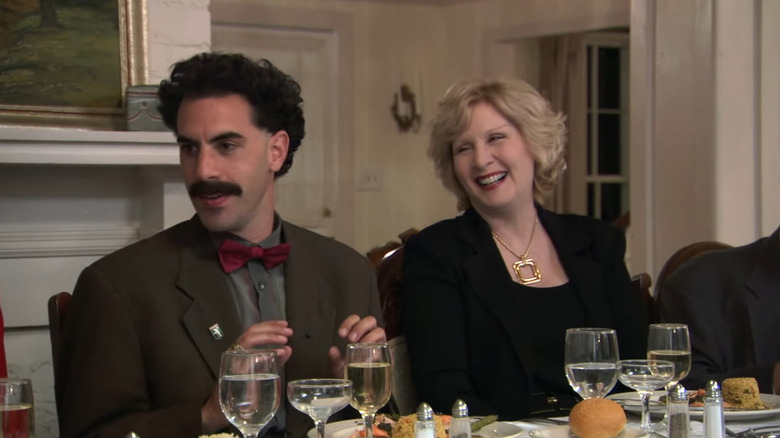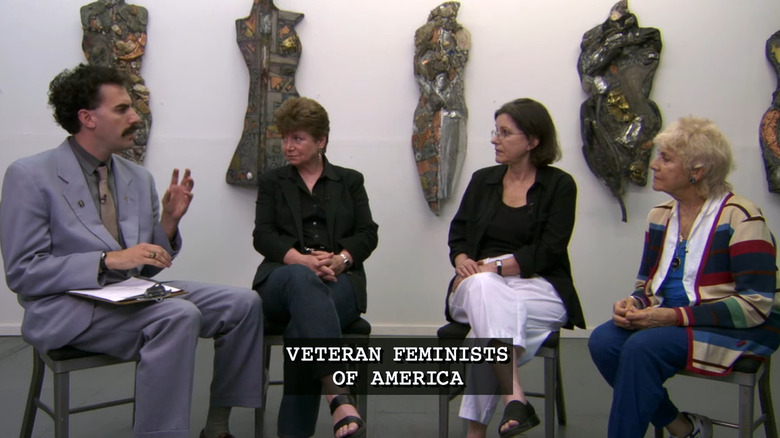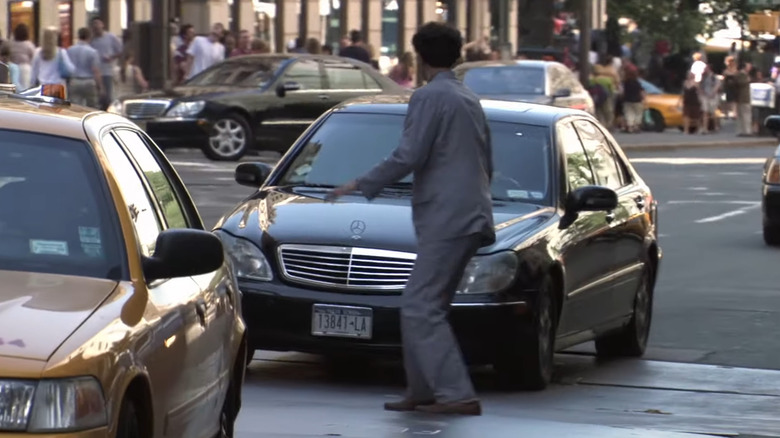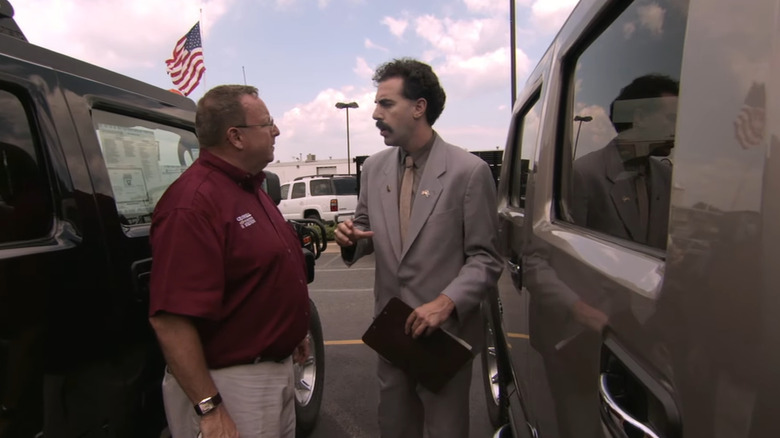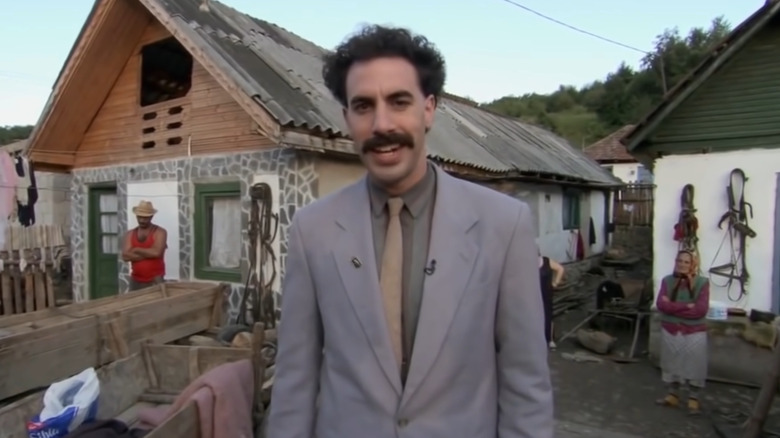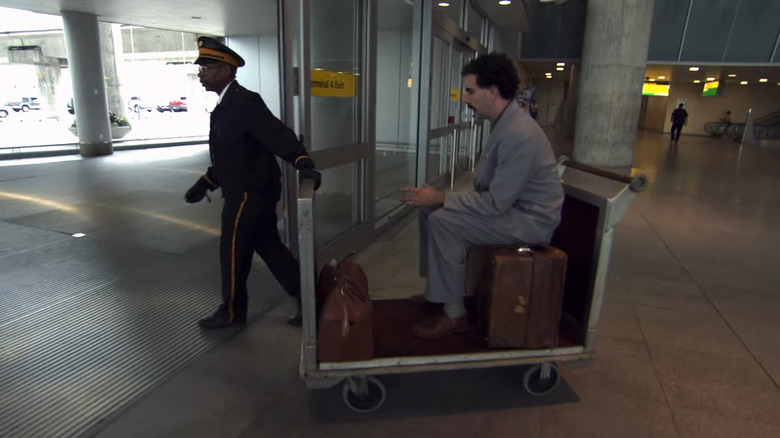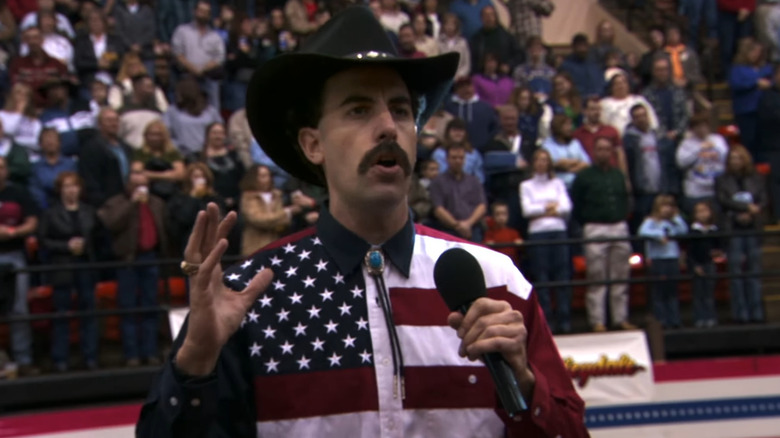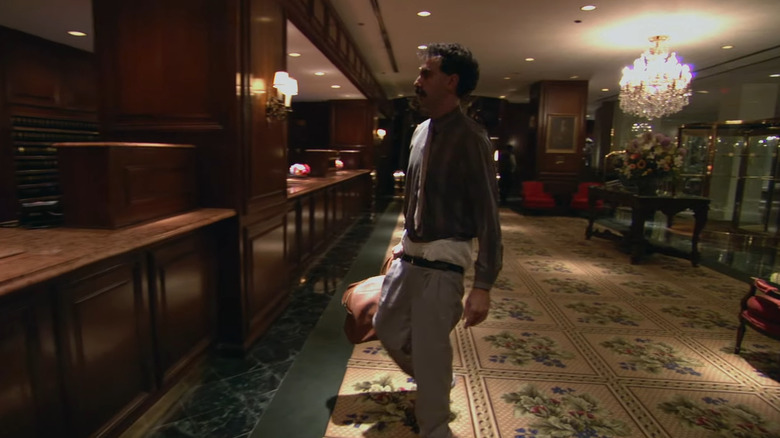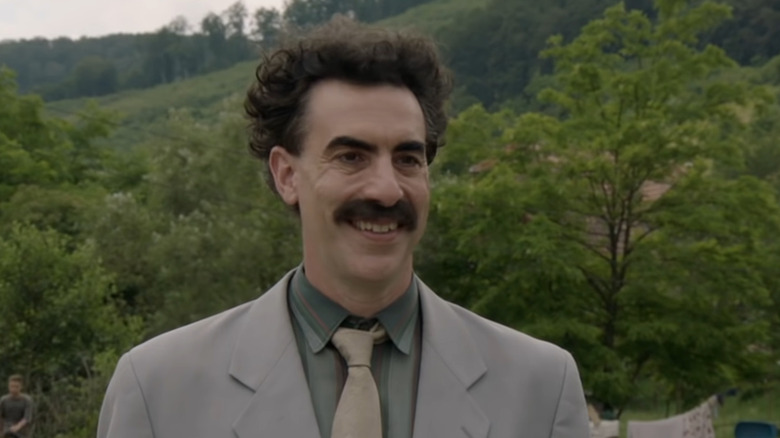Borat's Journey To The Big Screen Is As Wild As You'd Expect
It's 2006. You're at a dinner party. Your co-worker introduces you to their spouse. They begin their sentence in their regular voice and then transition into an impression you know all too well, because you've heard the same joke during every social gathering all year long. "This is my wife!" Nailed it.
"Borat: Cultural Learnings of America for Make Benefit Glorious Nation of Kazakhstan" — yes, that's really the full name of the film — debuted in 2006 as a movie in a category all its own. Part documentary, part "Punk'd," and a hint of sketch comedy, it's a one-of-a-kind vehicle starring Sacha Baron Cohen as the titular character, road-tripping across the United States. Borat wants to find Americans who can help him meet Pamela Anderson. Baron Cohen wants to use Borat's facade as a means to shed light on fringe communities within the country that contrast with what might be the default perception of America. The results have to be seen to be believed.
With a film as unique as "Borat," memories of its production provides a treasure trove of behind-the-scenes stories. This is the untold truth of "Borat," which we hope you'll find very nice.
Reality vs fiction
There's one question any viewer can't help but wonder after viewing "Borat": How much of that was fake?
Borat seems to be in the real world, but are his interactions fabricated and simply meant to look authentic? Especially given the normalcy of the mockumentary genre in the modern entertainment landscape compared to 2006 when "Borat" debuted, it can be easy to watch the movie today and assume it's simply a series of elaborately rehearsed sequences — but that's where you'd be wrong.
With a few exceptions, everything in the movie is as real as it gets. Salon provides a thorough go-to guide for every prank in the film and its varying degree of spontaneous vs. scripted. Borat is obviously a character, portrayed by Sacha Baron Cohen. His assistant, Azamat, is also a fictional persona played by actor Ken Davitian. Luenell the prostitute is an actor, as well, performed by Luenell Campbell. Everything else, from the man who insists on supporting the Confederate flag to the crowded rodeo cheering their approval of the ongoing war, is shockingly real.
The one exception? Pamela Anderson. Although she played coy publicly for some time, the pop culture icon was in on the joke that Borat would "kidnap" her at a book signing. Baron Cohen shared on the Daily Beast's Last Laugh Podcast that the crew had to film the scene on two separate occasions, because the crowd during their first attempt had a surprisingly mild reaction that made the scene dull and uninteresting.
What would you do if you were in this movie?
When "Borat" hit theaters in 2006 and became a sensation, not everyone was thrilled with the film's success. For legal purposes, anyone shown in "Borat" had to sign release waivers, and had every opportunity to be aware of the presence of camera crews following Borat's antics and recording their interactions with him. However, the participants fully believed the fake premise they were typically told: Borat was a real person from Kazakhstan, trekking across America to learn more about the nation's culture.
The Today Show traced the reactions of some of these subjects once they discovered the truth, running from simple criticism to lawsuits. The humor coach, whose instructions Borat repeatedly didn't listen to as the character told derogatory stories, had no ill will toward being publicly pranked, but was more concerned for other participants' reputations being damaged. On the other hand, the drunk frat boys Borat hitched a ride with later tried to sue 20th Century Studios, but Reuters reported they lost their case in early 2007.
Borat began as a bit character on an HBO series
The 2006 movie wasn't the first time Sacha Baron Cohen performed as Borat. He originated the character on "Da Ali G Show," which debuted in 2000 on HBO.
"Da Ali G Show" featured the title character Ali G — along with now-famous characters Borat and Bruno — all played by Baron Cohen, going into the wild to interview people in situations that will sound familiar to anyone who's seen the "Borat" movie. Even in his first appearances on television, Borat already showed a curiosity toward subjects like dating and the American south. In these brief sketches, Baron Cohen provided the foundation that would lead to the desire to give the character a full-length story all his own.
It was Ali G, though, who wound up with a movie first. Baron Cohen starred in "Ali G Indahouse" in 2002, which retained the same character from "Da Ali G Show" but was entirely scripted. For Borat's big-screen debut in 2006, producers chose to adapt the documentary stylings the character was known for. Baron Cohen later released a "Bruno" film in 2009.
Sacha Baron Cohen had hidden help when improvising
While the people and places Borat meets along his cross-country voyage were largely unrehearsed and spontaneous, filmmakers (including director Larry Charles) still prepared as much as they could in hopes for the funniest outcomes possible. Executive producer Dan Mazer shared with ABC News that this preparation included writing a script for the scenes, but not in the sense of a traditional screenplay.
A key part of Borat's character is that he's in an unfamiliar country, far away from his home nation of Kazakhstan. The crew used this to their advantage by having Borat carry around an English/Kazakh dictionary that he would make sense for the character to constantly refer to if he needed a bit of help translating his language. Unknown to the real Americans that Borat shared scenes with, this book was no dictionary at all. Instead, its pages were filled with 1,500 jokes the scriptwriters thought could fit Borat's personality in any given situation.
So, anytime you see Borat fervently flipping through its pages desperate for a translation, that's actually Baron Cohen searching for a joke to half-improvise within the context of whatever larger-than-life personality he found himself face-to-face with in that given scene.
Borat prompts provocative follow-up thinking
While "Borat" might appear to be just another goofy comedy on the surface, the film is a surprisingly layered commentary about topics as deep as nationalism, racism, homophobia, and antisemitism. In its blurred lines between parody and reality, "Borat" intersects a hyperbolized fictional character with real people who sometimes appear just as outlandish as him. Remembering that these people aren't trying to be funny, and are simply being themselves, prompts an intense internal dialogue about the American identity and how many people interpret that identity in dangerous ways.
Furthermore, the documentary style of the film — which told its participants they were being filmed, but misled them about the real premise of the movie — naturally prompts the viewer to ponder questions of ethics, which have been discussed thoroughly in academia. In an essay in the BU Arts & Sciences Writing Program's Journal, Hannah Pangrcic poses several thought-provoking questions on the subject.
"At what point, if at all, does Cohen's satire cross the line separating simple satire and actual prejudice?" Pangrcic asks. "Cohen would likely claim that it never does, and that his responsibility to the purpose of his film overrides his ethical responsibility to the audience, who may incorrectly interpret his satire. This disagreement attests to the confusing nature of the ethical expectations of documentary film — expectations that are often open to interpretation. Two people can scrutinize the same standard and interpret it in completely opposite ways, as Cohen and his critics evidently did."
One scene led to filmmakers being arrested
If you watched "Borat" peeking through your fingers, you're not alone. The movie is the definition of cringe comedy at the zenith of the subgenre's impact in the mid-2000s, made all the more squeamish by the fact that it's real. It's one thing to brace yourself through the "Scott's Tots" episode of "The Office," when you can remind yourself that Michael Scott is fictional, and didn't actually disappoint any kids with false hopes of a college education. It's another feeling entirely to watch a room full of real people at a real conference react in real time to the interruption of Borat wrestling his assistant, both men naked as they run through a crowded ballroom.
As Borat's character pokes the boundaries of social interactions and toes the line when it comes to the law, the results can sometimes be understandably dicey. In an interview with ABC News, "Borat" executive producer Monica Levinson revealed that one sequence led to her and another crew member being arrested, though they were only detained temporarily.
Levinson said the scene took place at a New York hotel and didn't make the final cut of the movie. During the authorities' questioning, they suspected something was off about the situation, and Levinson finally realized they wanted her to confess that she worked for Ali G, a similar but separate fictional character previously played by Sacha Baron Cohen on television. Close, but not quite.
Borat has the stamp of approval from comedy greats
It stands to reason that if you can make a comedian laugh, you're pretty darn funny. It can be fascinating to think about what kinds of humor inspire famous comedians. What do they study? What makes them think? Or, in contrast, what helps them relax and laugh away from work, just as their own material does for others? It turns out that "Borat" is a comedy beloved by some of the funniest people in the business.
In a 2019 comedian roundtable with the Hollywood Reporter, pros of the craft praised the film. During the discussion, as Sacha Baron Cohen mentioned the movie, Jim Carrey immediately showered him with accolades. "You killed it, man. Amazing," Carrey said. "I love that movie so much and I love you. I love your approach to uncomfortable people and subjects. You just lay bare the people who are supposed to be in control and aren't, and I love it." Henry Winkler and other Hollywood vets can be heard in the background affirming Carrey's sentiments.
Sacha Baron Cohen never washed his suit
A small detail in "Borat" will never be noticed by the audience (unless they ever show the film in Smell-O-Vision), but provided yet another layer of authenticity. If Borat were really traveling across America completely on his own with no game plan, he probably would not take the time to be concerned with his physical appearance or personal hygiene, much less have a means to address such matters.
Taking this hypothesis to its natural conclusion, filmmakers decided to never wash Borat's suit. This way, while he encountered different people as his journey grew longer and longer across the country, he'd smell bad, helping maintain the illusion of his misadventure to the people with which he spoke. Executive producer Dan Mazer told ABC News, "He only had that suit and that underwear the whole time, and he reeked."
GQ awarded Borat a special honor
As "Borat" the movie became part of the cultural zeitgeist of 2006, so too did Borat the character. Earning a rare place in American entertainment — alongside Kermit the Frog, Mickey Mouse, and very few others — Borat began to make public appearances in character as his fictional persona. Interviewers spoke with him in character as Borat, not Sacha Baron Cohen, despite the fact that all parties involved now knew the act was fake.
During the press junket for the film, the studio asked journalists to submit their questions several days in advance. Cohen and his team of comedy writers would compose funny in-character responses and load them into a Teleprompter. Journalists were instructed to enter the room, ask their scripted questions — and then Borat would give his response. At no point would Cohen break character.
Keeping with this preservation of the character's authenticity, GQ honored Borat Sagdiyev — the character, not the movie and not Baron Cohen — as the 2006 recipient of its Editor's Special Award. The magazine described Borat as "a journalist whose forthcoming documentary highlighting the social, cultural, and political differences between East and West is set to be one of the cinematic highlights of the year." In the interview spotlighting Borat's acceptance of the honor, Borat himself said, "Thank you. I will place this award next to the one I win for being able to suspend a car battery from my testes longer than any other man in Kuczek."
Isla Fisher preferred not to know about dangerous stunts until afterwards
Sacha Baron Cohen married Isla Fisher in 2011, some nine years after they had begun dating, meaning Fisher saw her husband's full "Borat" journey from start to finish. Due to the risky nature of some scenes that occasionally involved the authorities or could potentially turn sideways if not navigated cleverly, Fisher didn't like to be in the loop if Baron Cohen attempted crazy stunts until after he completed them.
Fisher spoke on "Jimmy Kimmel Live!" in 2020 about her husband's crazy exploits as Borat over the years.
"Luckily, Jimmy, he doesn't really tell me when he's gonna do the super dangerous stuff until he's done it," Fisher said. She went on to compare her after-work discussions with her husband to some of the conversations an everyday couple might have at the end of their day. "It's not a normal question of, 'Did you pick up the dry cleaning?' or 'What did you shoot today?' He'll say, 'Yeah, we went to a gun rally' or 'I was almost arrested.'"
Borat received award-season accolades
While the onscreen antics in "Borat" are about the complete opposite of the sophisticated, high-brow proceedings of typical Hollywood award shows, the movie nonetheless received attention come award season. "Borat" writers Sacha Baron Cohen, Anthony Hines, Peter Baynham, Dan Mazer, and Todd Phillips were nominated for an Oscar for Best Adapted Screenplay, though they lost to "The Departed."
While "Borat" is an unscripted documentary in a sense, it still had a loose screenplay, making its script eligible in this category. The film required "Adapted" categorization since Borat's character had originated on a TV show prior to his big feature film.
At the Golden Globes, "Borat" was nominated for best motion picture — musical or comedy (an award that ultimately went to "Dreamgirls") and Baron Cohen won the Golden Globe for best actor in a musical or comedy. In his acceptance speech, Baron Cohen said, "This movie was a life-changing experience. I saw some amazing, beautiful, invigorating parts of America, but I saw some dark parts of America, an ugly side of America, a side of America that rarely sees the light of day. I refer, of course, to the anus and testicles of my co-star, Ken Davitian."
Perhaps the funniest unintended consequence of the "Borat" nominations was presenters onstage navigating the movie's full, outlandish mishmash of a title — "Borat: Cultural Learnings of America for Make Benefit Glorious Nation of Kazakhstan" — every time it was up for an award.
Sacha Baron Cohen believed he'd never play Borat again
The success of any given "Borat" scene relies on the people Sacha Baron Cohen encounters believing his character is the real deal. If everyone just went 'Hey look, it's Borat!' the production crew might as well call it a day.
Once the "Borat" movie became a cultural touchstone, to the point where it inspired one of the year's most popular Halloween costumes, it was no surprise Baron Cohen said he'd never return to the character.
"It is like saying goodbye to a loved one," Baron Cohen said in 2007. "It is hard, and the problem with success, although it's fantastic, is that every new person who sees the Borat movie is one less person I 'get' with Borat again, so it's kind of a self-defeating form, really."
Shockingly, American culture did eventually reach the point where Baron Cohen could fool enough people again to bring Borat back — including Rudy Giuliani. In 2020, he starred in "Borat Subsequent Moviefilm," another buzzworthy hit that was nominated for multiple Oscars. Leaving one obvious question: in another decade or so, could Baron Cohen don the mustache again? It might still not win him the Oscar, but at the very least, he'd certainly warrant a high-five.
